16 Dec Four Factors That Affect Your Forklift’s Economic Life
Toyota Material Handling Systems is happy to have Alex Hilke from our sister dealership Conger Industries as a guest writer on our blog! Conger is Wisconsin’s premier material handling solutions provider representing Toyota.
A major topic of discussion when purchasing a new forklift is the difference between economic life and useful life. Also, what factors effect those timelines?
Alex explains:
If you’re shopping for a new forklift, chances are you’ve wondered how long a forklift should last. To give you the “quick” answer, it’s usually about 10,000 hours. But you should be aware that other factors can affect the lifespan of a lift truck. This article will highlight four main factors that influence the economic life of your forklift. Purchasing material handling equipment is not a short term investment. Having a basic idea of the economic life of your forklift will position you for future material handling purchases and budgeting.
Let’s get to it!
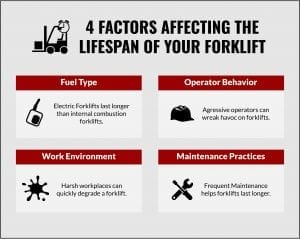
Fuel Type
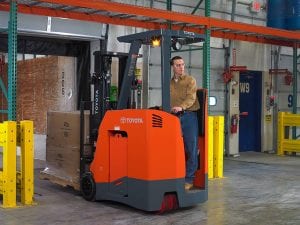
Electric forklifts typically outlast internal combustion models.
Fuel type plays a big role in how long a forklift will last. Internal combustion – or IC for short – lift trucks have long been the most common type of forklift in industry. But electric forklifts have begun to overtake them in recent years. One of the reasons is that electric lift trucks tend to have longer life spans than their IC counterparts. That’s because electric lift trucks have fewer moving parts. Fewer parts mean fewer things to go wrong, a reduction in maintenance costs, and ultimately a longer lifespan. Of course, some items must be replaced routinely, like forks, tires, and lift chains. That’s the same for all lift trucks, regardless of fuel type. But beyond those items, electric trucks typically only need to have their battery replaced once it has reached the end of its use. A new battery is required every five years on average. The lift truck itself, however, will outlast the battery by a longshot. In fact, Toyota electric trucks have been known to last as long as 50,000 hours! So the lesson is: If you want maximum longevity from your lift truck, consider going electric.
Work Environment
Forklifts work in a variety of environments. But not all environments are created equal. For example, some facilities can be filled with lots of dirt and debris, like recycling plants and organic material processors. Others
have excessive moisture, like food processing plants and cold storage facilities. Others yet can contain harsh substances, like insulation manufacturers and chemical plants. Consequently, these working conditions can degrade lift trucks considerably.
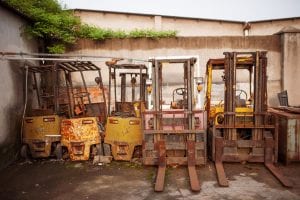
Tough industrial settings can shorten your lift truck’s life.
Some common ailments include:
- Locked up drive motors and axles
- Clogged cooling systems
- Rust
- Corroded electrical systems (especially buttons and switches)
Luckily, there are some things you can do to improve your lift truck’s longevity in rough surroundings.
Some simple steps include:
- Keep the lift truck clean, dry, and stationary as much as possible to limit rust
- Remove debris by frequently blowing out the forklift with air
- Cover any exposed wires to limit corrosion
While you may not be able to change the nature of your business, you can still work to protect your equipment from extreme environments.
Maintenance Practices
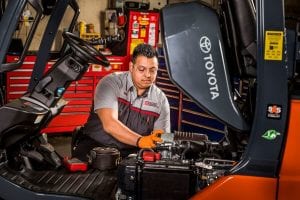
Quality maintenance goes a long way toward improving your lift truck’s lifespan
Lift trucks need periodic maintenance to ensure their safety and mechanical integrity. If maintenance is neglected, it will reduce the life of the fork truck. It also makes it more uncomfortable and dangerous for operators to do their jobs. Plus, it’s against the law. Standard 1910.178(p)(1) of the Occupational Safety and Health Administration (OSHA) requires that lift trucks with any defects be repaired before returning to service. Operator pre-shift inspections are a good way to catch any obvious mechanical or safety problems. But they’re not enough. Forklifts also need to undergo maintenance at regular intervals. Unfortunately, many companies struggle to keep up with their lift truck maintenance. That’s why signing up for a maintenance plan offered by a forklift dealership is so valuable Regular maintenance will help identify any issues before they balloon into more serious and expensive repairs. Overall, committing to a consistent maintenance routine can go a long way toward extending the life of your fork truck.
Operator Behavior
Forklift operators play a big role in the longevity of lift trucks. Aggressive driving, carelessness, and inattention can quickly degrade your equipment. Take speeding, for example. Masts, drive axles, and overhead guards are particularly susceptible to costly impact damage by speeding drivers. Another common issue is how operators of internal combustion forklifts use the inching pedal. Because overuse can damage the transmission, bringing on a costly repair. One more operator behavior issue is whether they are completing the previously mentioned pre-shift inspections. If they’re not, the lift truck can suffer dire consequences. For instance, low oil can ruin an engine, potentially requiring the replacement of the whole forklift. Admittedly, how operators use their fork trucks is difficult to control.
But through a quality operator training program, you can make great strides. In fact, OSHA found that properly trained operators can reduce accidents by up to 70%!
Other tips you can try include:
- Setting up speed control to limit the fork truck’s maximum speed
- Installing collision-detection systems to alert supervisors to impacts
- Rewarding operators who go without accidents or damage for a certain amount of time
In the end, eliminating poor operator behavior will make the workplace safer for everyone. It will go a long way toward extending the life of your equipment.
Economic Life vs. Useful Life
Now, the factors above may not necessarily render your lift truck inoperable. In fact, it may keep hobbling along for some time. However, just because you can keep using your forklift doesn’t mean you should keep using it. Because an old, worn-out fork truck can nickel-and-dime you. If that’s the case, it makes more sense to simply buy another one. Sadly, this is something that many companies just don’t take to heart…with expensive consequences. But how do you know exactly when you should junk your old truck and get a new one?
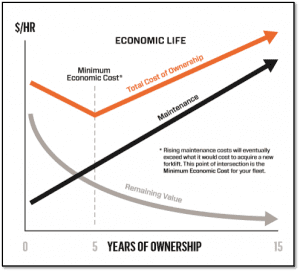
The economic life of your forklift will tell you when it’s time to replace it.
Answer: By calculating its “economic life”.
Let’s explain…
The useful life of a forklift is simply how long it can continue to function. But the economic life is a measure of when maintenance costs exceed the price of a new or used lift truck. For example, a gas-powered lift truck running 8 hours per day, 5 days per week will max out its economic life in about 5 years (all things considered).
It’s at that point when you’ll be better off financially buying a new forklift rather than repairing your old one. To calculate the economic life of your equipment, you can use this free calculator from Toyota. Doing so will help you avoid falling into a “money pit” with your equipment.
Questions?
Want to know if any forklifts in your fleet are close to the end of their economic life? We would be more than happy to visit your location and perform an audit on your forklift fleet. Whether it is right sizing your fleet, repairing, or replacing we want to ensure that your material handling spend is optimized.
Contact Us
About
Alex Hilke is a writer with Conger Industries, a material handling dealership and service center headquartered in Green Bay, Wisconsin.
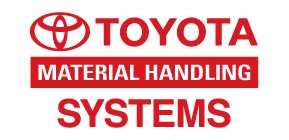

Sorry, the comment form is closed at this time.